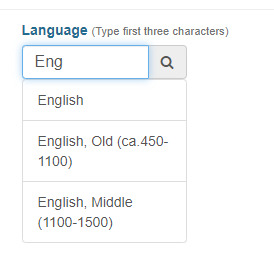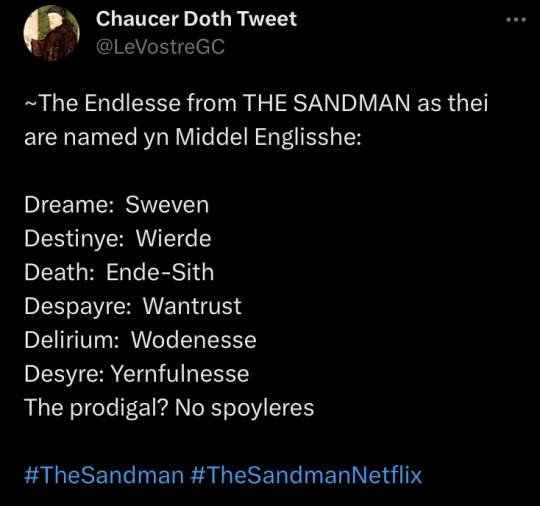#Middle English
Text
Like Bardcore is a thing and nobody was going to tell me about it?
youtube
3K notes
·
View notes
Text
The word knight sounds like night but it's written with a K. That's because it used to start with a [k] sound, just like German Knecht, which has the same Proto-Germanic ancestor. The letters GH used to be pronounced as well. The video lets you hear the reconstructed evolution of knight from Proto-Germanic to Southern British English.
The common Proto-Germanic ancestor of knight, German Knecht and Dutch knecht meant 'boy; servant; attendant'. In Middle English, knight came to denote an attendant who became a soldier, and subsequently a soldier who became a nobleman through knighthood.
#historical linguistics#linguistics#language#etymology#english#old english#middle english#early modern english#proto-germanic#proto-west germanic#lingblr
52 notes
·
View notes
Text
Had to fill out a new form for my psychiatrist's office recently -- pretty standard stuff, including a drop-down for race/ethnicity and another for primary language.
But when I entered "english" in the Primary Language search bar as requested, it offered me some amazing, exciting options.

[ID: A screengrab of the form, where I have typed "eng" in the search bar; three options are visible below. The options are "English", "English, Old 450-1100" and "English, Middle 1100-1500".]
I know it's just because the form autoloaded a preset list of languages from somewhere that included Old and Middle English, but I'm still tickled by the idea that Clarity Clinic Chicago has people onboard who could prescribe Adderall for Caedmon or help Shakespeare sort out his gender issues.
3K notes
·
View notes
Text
Fun fact No. 1: People hear Dream speaking their native language.

Extrapolation : If Dream tells someone his name is “Dream” they’ll hear the word “dream” (eg. a Spanish speaker would call him “Sueño”)
Fun Fact No 2: Hob Gadling’s first language is is Middle English.
Fun Fact No 3: The Middle English word for dream is “Sweven.”

Ergo: Hob Gadling would cry out “Sweven” during sex.
I hope this knowledge has improved your life.
#BTW does anyone know that kids name#read through all of Brief Lives and he’s only called son grandson or boy#This is gonna bother me I know it#Naming Conventions#The Sandman#Dream of the Endless#Hob Gadling#Dreamling#Middle English#Sweven o ye Endlesse#Chaucer Doth Tweet
526 notes
·
View notes
Text

How English Changed Over The Last 1000 Years
#linguistics#english#etymology#language#languages#world culture#history#world history#old english#middle english#educational#fascinating
852 notes
·
View notes
Text

cover illust for funsies ❦❧
i settled on a blend of the 2021 film (which slaps) and the 14th century romance (which also slaps albeit unintelligibly).
#the green knight#the green knight art#deep winter#happy new year#artists on tumblr#cover illustration#original illustration#digital illustration#captnbas#basil draws#arthurian legend#arthurian mythology#nah in truth I had fun trying to figure out Middle English#langblr#middle english#british folklore
273 notes
·
View notes
Text

A living man and a skeleton with a lot of script between them. The script is cursive and in Middle English.
Add MS 37049 f.83r
British Library
#medieval#medieval manuscripts#middle ages#medieval core#middle english#manuscripts#skeleton#cursive
80 notes
·
View notes
Text
Time Travel Question 34: Medievalish and Earlier 3
These Questions are the result of suggestions from the previous iteration.
This category may include suggestions made too late to fall into the correct earlier time grouping. Basically, I'd already moved on to human history, but I'd periodically get a pre-homin suggestion, hence the occasional random item waaay out of it's time period, rather than reopen the category.
In some cases a culture lasted a really long time and I grouped them by whether it was likely the later or earlier grouping made the most sense with the information I had. (Invention ofs tend to fall in an earlier grouping if it's still open. Ones that imply height of or just before something tend to get grouped later, but not always. Sometimes I'll split two different things from the same culture into different polls because they involve separate research goals or the like).
Please add new suggestions below if you have them for future consideration. All cultures and time periods welcome.
#Old English#Middle English#Linguistics#Vikings#North American History#Time Travel#Early Middle Ages#Indigenous History#Prester John#Middle Ages#Koran#Greenland#King Olaf#Arthuriana#Post Roman Britain#Heian Era Japan#Japanese History#Rapa Nui#Ammonites
129 notes
·
View notes
Note
Do you have any books or sources for learning Olde English? I want to write a medieval-based story but I don't know how to write the characters speak the language.
That depends -- when you say "Olde English" do you mean Old English, like pre-1066 English? That's pretty far from modern English and it's unlikely that readers will be able to understand it easily. If that's what you're looking for, the texts I was taught with are:
Bright's Anglo-Saxon Reader
Quirk's Old English Grammar
Sweet's Anglo-Saxon Reader
They're all from a while back -- and, as you can see, some use the now-deprecated term "Anglo-Saxon" -- so you can find older editions free in the public domain. More recent revised editions can generally be found in cheap paperback form. I believe there are some more modern textbooks that are quite good, but I haven't looked at them, and I don't know how affordable they are.
I have also consulted with Zoe (@meanderingmedievalist) on this, and she recommends Baker's Introduction to Old English, as well as the related resource Old English Aerobics:
The reason there are textbooks for this, though, is because you genuinely have to treat it as a foreign language. It's very different from modern English. As a sample, here's the beginning of Beowulf:
Hwæt! We Gardena in geardagum
þeodcyninga þrym gefrunon
hu ða æþelingas ellen fremedon.
Oft Scyld Scefing sceaþena þreatum
monegum maegþum meodosetla ofteah
egsode eorle syððan aerest wearð
feasceaft funden he þæs frofre gebad
weox under wolcnum weorðmyndum þah
oð þæt him aeghwylc þara ymbsittendra
ofer hronrade hyran scolde,
gomban gyldan þæt wæs god cyning.
So if you put a lot of it into a story for a modern audience, most of them will be a bit lost.
If when you say "Olde English" you mean "English that sounds archaic and medieval, but is comprehensible to a modern audience", you're probably looking for Middle English.
I don't have any direct references for learning the language there, as I was mostly taught through immersion (i.e., here's a Middle English text, read and translate it, now do another until you get a feel for it), but Zoe recommends Fulk's Introduction to Middle English, so that's a good bet if you don't want to go through that process.
However, I do think the "just read the texts" method also works fine -- especially since, if you're writing a medieval story, you'll want to read some of the literature anyway for inspiration. Here's what you can do to use that method outside of a classroom setting:
Step One: Get a Middle English text with a facing-page translation. Armitage's edition of Sir Gawain and the Green Knight is good for this. Read the Middle English text, referring to the Modern English translation on the facing page whenever you don't understand it. Do this with a pencil in hand, so you can annotate the text with definitions, translations, and notes about how the sentences work.
Step Two: Get a Middle English text for which modern translations exist. Don't get the modern translation. The Canterbury Tales works for this: it's a classic and you should be able to pick up a copy anywhere. The version on my shelves is Baugh's Chaucer's Major Poetry -- which is heavily footnoted with definitions, potentially saving some time with the dictionary -- but it doesn't really matter as long as it's in the original. Read it. Every time you don't know a word, look it up in the Middle English Dictionary (available free online, in searchable form, here) and write it down. Again, best to annotate directly on the page with a pencil. Trust me, it helps to do it that way. Once you're done, get a modern translation and check your work.
At this point, you'll probably have picked up enough of the language that you should be able to write in it to some degree, though you'll want to continue making reference to the Middle English Dictionary to make sure you're employing period-appropriate usage and spelling. If you have access to the Oxford English Dictionary (if you're at a university, you almost certainly do, otherwise check with your local library), use that to check when the words you're using originated -- the OED has that listed, and that'll keep you from accidentally dropping an 18th-century term into medieval dialogue. You can also use their Historical Thesaurus to find period-appropriate equivalents for terminology.
Optional Step Three: Keep reading more Middle English literature with the dictionary open, annotating as you go, to get additional practice. If you can get through Le Morte Darthur in the original (get the P.J.C. Field edition), I think you'll be set in terms of "writing convincing medieval prose". Not because it's particularly difficult -- it's late medieval, so the language is actually more modern than either of the texts mentioned in steps one and two -- but just because it's long, so you'll get a lot of practice working through it. As a bonus, reading Malory will familiarize you with lots of good knightly vocabulary in case that's the kind of story you want to write.
Optional Step Four: Read scholarly articles on Middle English language and literature to get a more in-depth understanding. Again, check with your local library, or if you're at a university, a university library will have a vast amount of resources on this subject you can browse through.
72 notes
·
View notes
Text

#same#source: treasury of english poetry caldwell/kennedy#1984#middle english#medieval#middle ages#literature#english literature#quotes#poetry#poems#cozycore#cozy aesthetic#cozy#lazy#poet#writing#reading#aesthetic#dark academia#academia#history#books#romantic#rainyweather#rainyday#rain#soft#winter
117 notes
·
View notes
Text
turns out the "ye" in "ye olde tavern" was never meant to be pronounced literally as "ye"! in middle english, it was written as "þe", using the now unused letter thorn (the þ) which is pronounced as "th". since it doesn't really look like any recognisable modern English letters it got misunderstood as a y, hence "ye". .... it's literally just "the". it's just "the old tavern".
#apologies if this has crushed your renfaire-speak dreams#middle english#history#medieval history#ye#ye olden days#fun facts#ye is more fun anyways
92 notes
·
View notes
Text
Lady: 'bread kneader'
Lady stems from a compound meaning 'bread kneader'. It consisted of Proto-West Germanic *hlaeb (bread), the ancestor of loaf, and *daigijā (kneader), a derivation of *daig, the ancestor of dough. In Old English, the compound had become hlǣfdiġe, meaning 'mistress of the household'. Click the video to hear how it changed in 2500 years.
#historical linguistics#linguistics#language#etymology#english#old english#middle english#early modern english#proto-germanic#proto-west germanic#lingblr#video#audio
243 notes
·
View notes
Text


early march. ᵔ⤙ᵔ
#bobastudy#my posts#studyblr#academia#aesthetic#dark academia#study with me#light academia#psych major#english major#Middle English#medieval#Medieval English#medieval poem#latte#oat latte#annotations#academic weapon#academia aesthetic#study aesthetic
54 notes
·
View notes
Text
Did not realize the Green Knight's moniker was meant so literally. I figured his armour was green, but apparently so is everything else including and specifically his eyebrows:

78 notes
·
View notes
Text

Sir Gawain and the Green Knight
#sir gawain and the green knight#sir gawain#green knight#j.r.r. tolkien#tolkien#art#poem#england#middle english#chivalry#chivalric romance#chivalric#wizards#knights#holy quests#gawain#knight#medieval#middle ages#arthurian#noble#king arthur#tale#history#romance#adventure#enchantment#temptation#destiny#forests
2K notes
·
View notes
Text
shephierdboy1467 Follow
Forȝif me for enfodroppen fro morne arly unto high prime, bute mine orygynal carectier Owaine is suche an himmbo 😂 I loue him <3
12 notes
832 notes
·
View notes